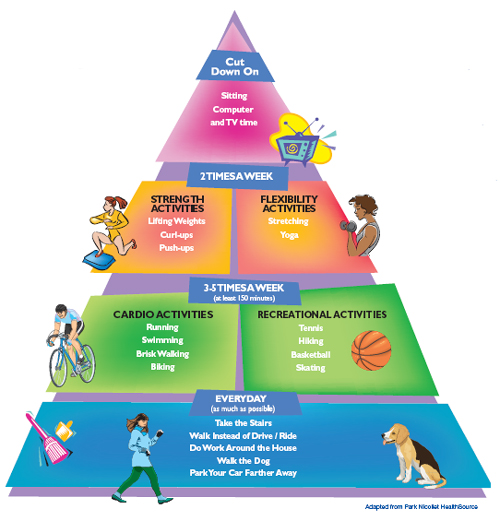Exercise
Exercise provides many benefits to overall health and well-being. These benefits include:
- Improving your chances of living longer and living healthier
- Helps protect you from developing heart disease and stroke or its precursors, high blood pressure and undesirable blood lipid patterns
- Helps protect you from developing certain cancers, including colon and breast cancer, and possibly lung and endometrial (uterine lining) cancer
- Helps prevent type 2 diabetes (what was once called adult-onset diabetes) and metabolic syndrome (a constellation of risk factors that increases the chances of developing heart disease and diabetes; read more about simple steps to prevent diabetes)
- Helps prevent the insidious loss of bone known as osteoporosis
- Reduces the risk of falling and improves cognitive function among older adults
- Relieves symptoms of depression and anxiety and improves mood
- Prevents weight gain, promotes weight loss (when combined with a lower-calorie diet), and helps keep weight off after weight loss
- Improves heart-lung and muscle fitness
- Improves sleep
How much exercise is enough?
Guidelines for age groups vary, but in general, 30 minutes of modest activity preferably every day of the week is recommended. Modest activity is any activity that is similar in intensity to brisk walking at a rate of 3-4 MPH, such as, cycling, yard work or swimming.
My day is already so busy. How can I possibly fit in 30 minutes a day?
Studies show that even 30 minutes a day broken into three 10 minute intervals have a positive impact on health. Most people are very busy these days. Even the busiest people can fit in 10 minutes at time. START SOMEWHERE!
- Talk a 10 minute walk on your lunch break or before work or after dinner. Better yet, after dinner, bring the kids & do it as a family!
- Get up and walk around your house for 10 minutes at a time
- Use the stairs instead of the elevator
- Walk up and down your stairs for 10 minutes
- Park far away from the building and walk in. When shopping with kids pick the furthest spot and have them count how many steps it takes to get into the building. Try to beat the max number on the next shopping excursion.
My surgery is next week; it’s too late to start now I’ll wait until after surgery!
No, Start as soon as possible! Even engaging in a little exercise prior to surgery can help optimize your surgical experience and recovery. Keep it simple, walk everywhere in your house twice. For example, if you go to the kitchen for something, walk there and back twice. Starting habits early will help you continue them after surgery. Early mobilization after surgery improves surgical outcomes!
For more information about incorporating exercise into your life please see the following web sites. Always consult your physician prior to initiating a new exercise routine.
http://www.health.gov/PAGuidelines/
http://www.cdc.gov/physicalactivity/
http://www.letsmove.gov/




